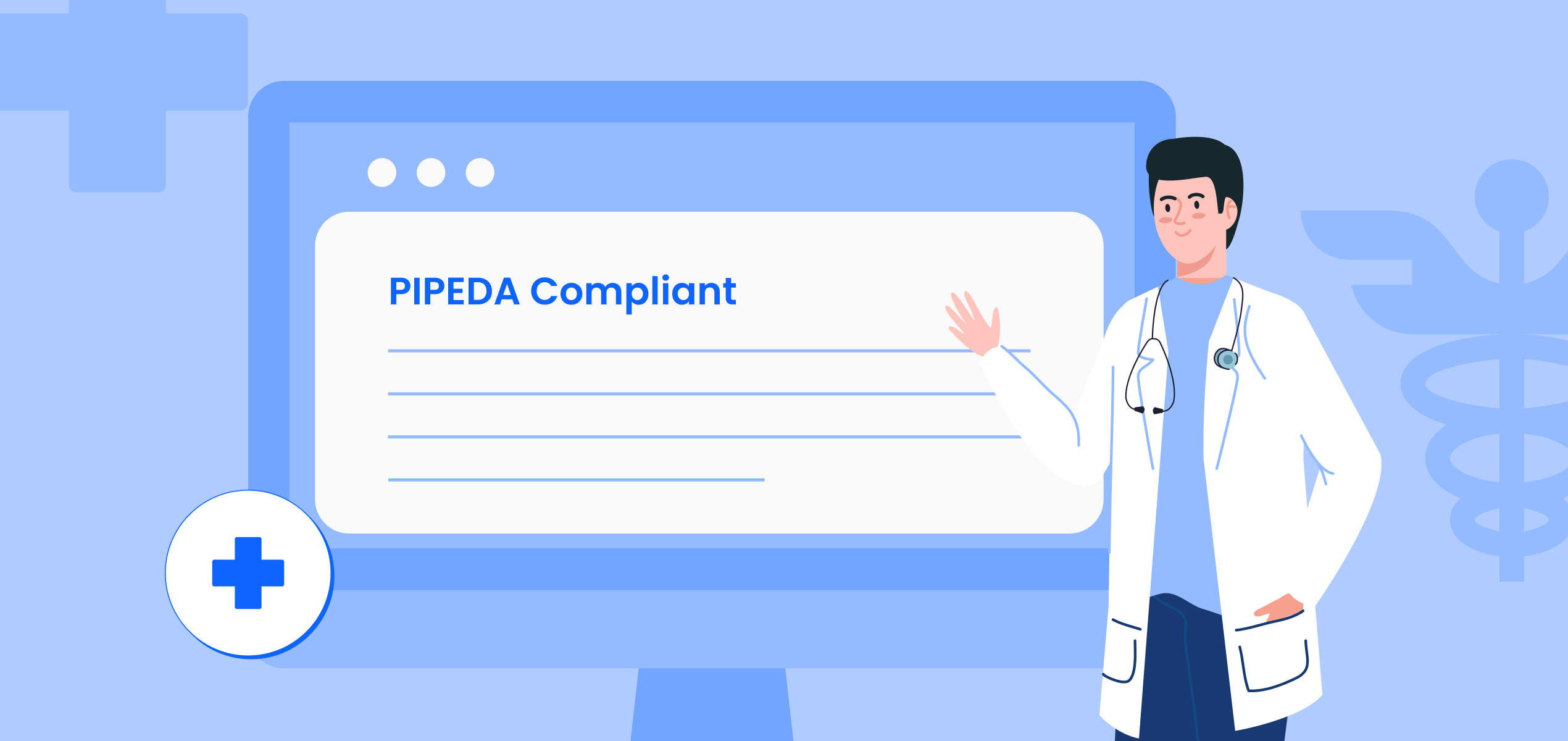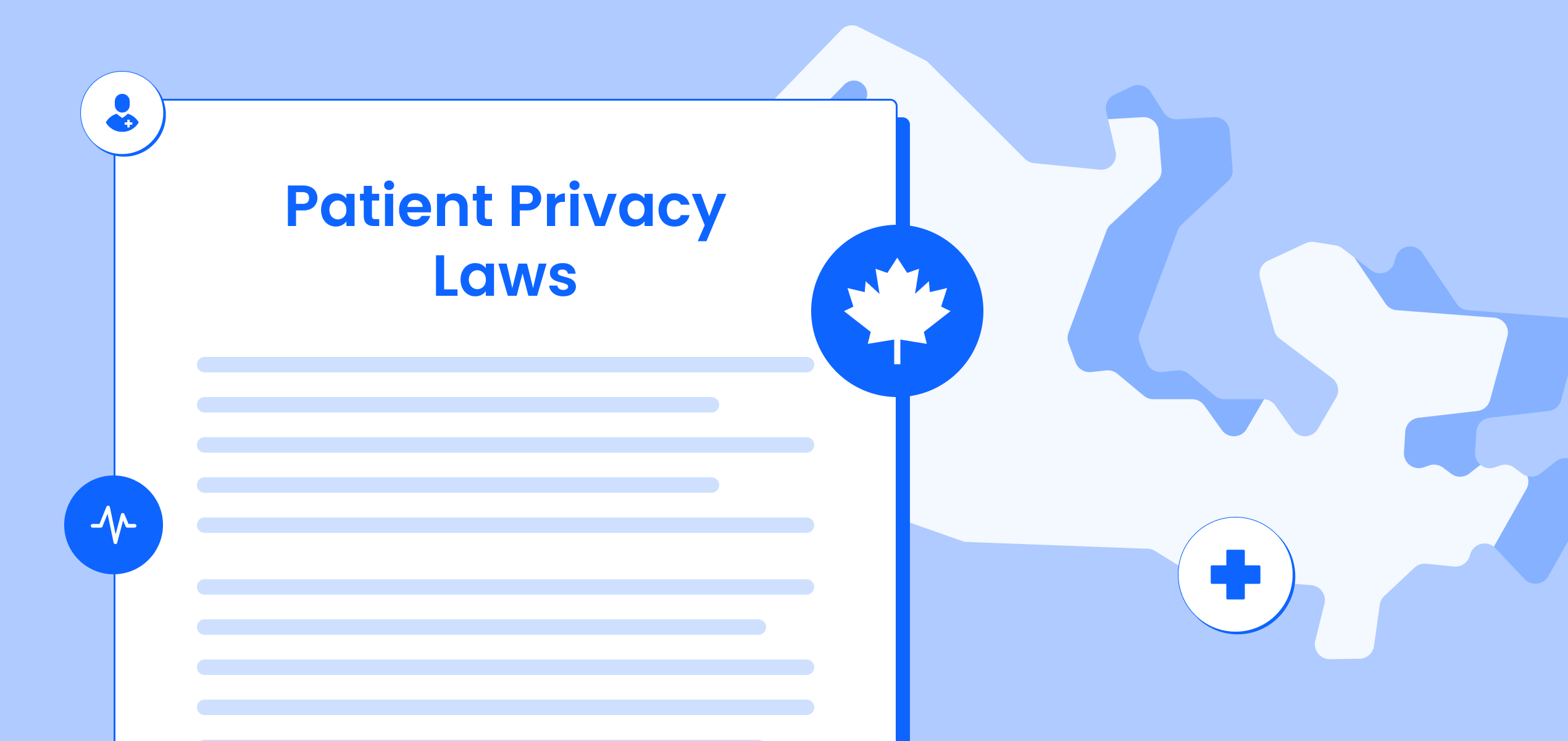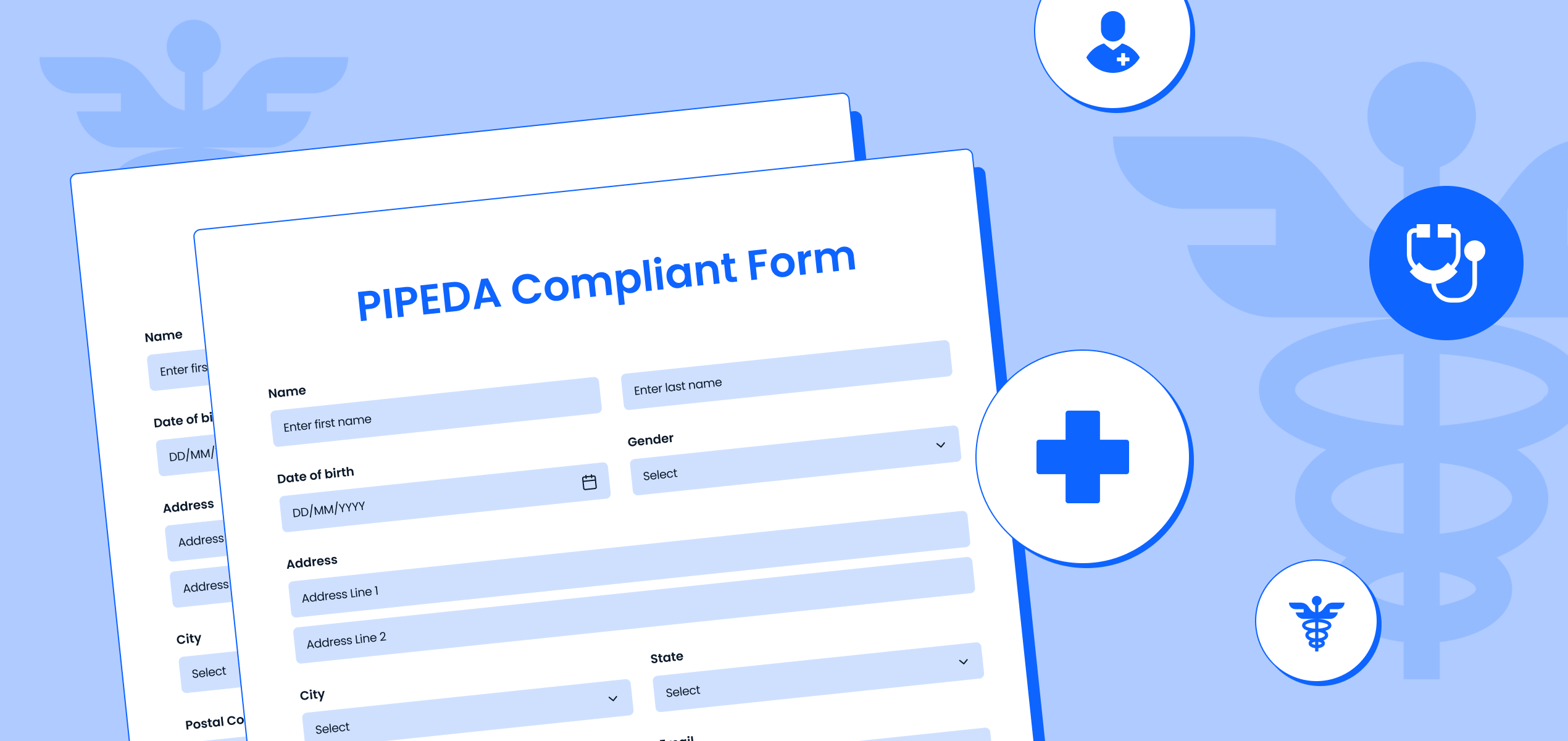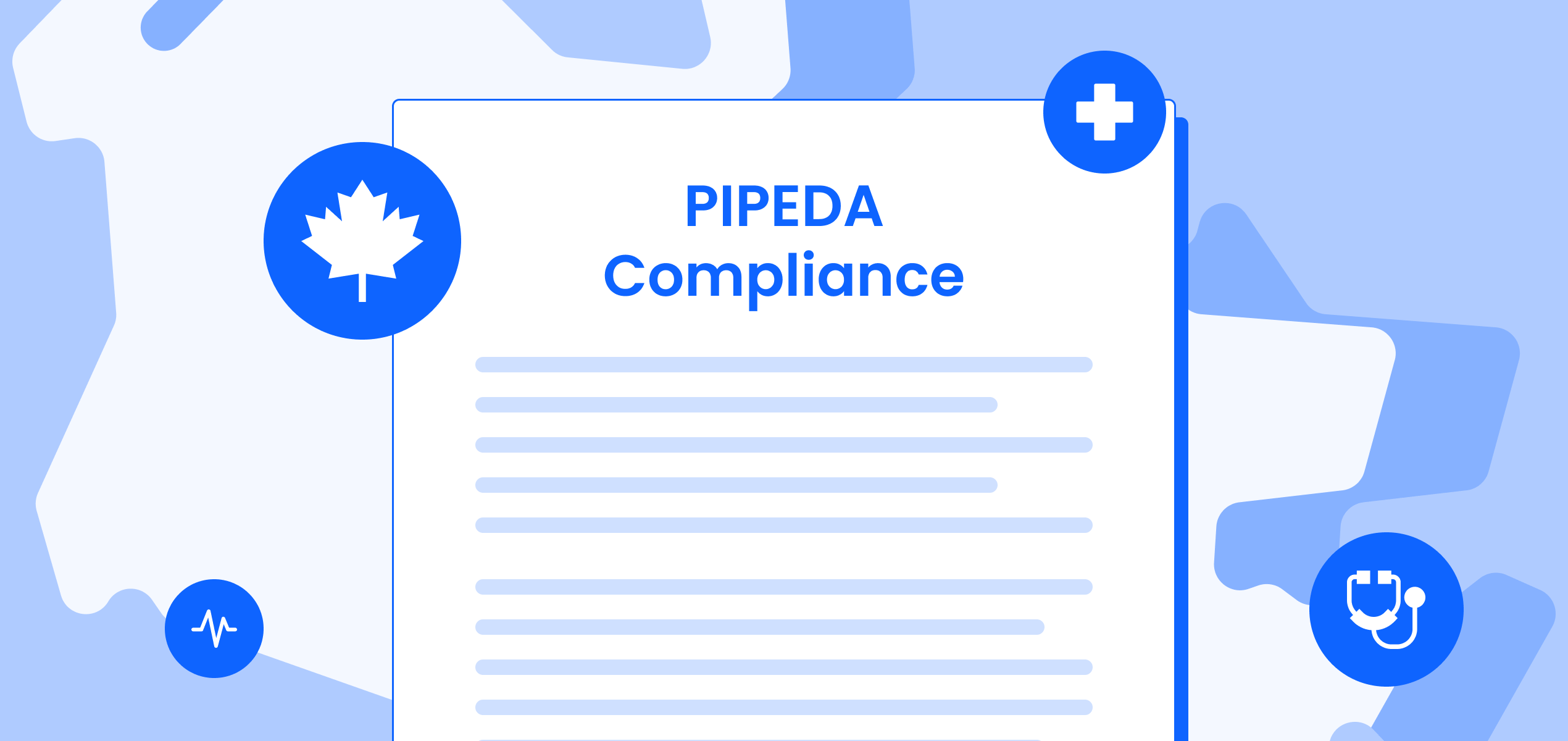In an era where data breaches and privacy concerns are prevalent, PIPEDA provides a framework for responsible data management, helping medical practices maintain the confidentiality and integrity of patient information while delivering quality healthcare services.
Canada’s federal privacy law, Personal Information Protection and Electronic Documents Act (PIPEDA), applies to private-sector organizations across Canada that collect, use, or disclose personal information in the course of commercial activities. It also sets the ground rules for how enterprises must take care of personal health information.
Compliance with PIPEDA not only ensures legal adherence but also builds trust with patients, safeguarding their privacy rights.
In this blog, we will help you understand whether you need to be PIPEDA compliant and how you can comply with PIPEDA with our 6-step PIPEDA compliance checklist.
Let us begin with –
Who needs to comply with PIPEDA
Although PIPEDA governs all private sector organizations, in the context of medical practices, it is mandatory for the following entities to comply with PIPEDA:
1. Private healthcare providers
Healthcare providers that include privately-owned medical clinics, physiotherapy centers, dental offices, and other healthcare facilities that operate as businesses.
Health-related businesses
This includes enterprises that provide health-related services, like medical laboratories, pharmacies, and medical equipment suppliers.
Healthcare professionals in private practice
PIPEDA compliance also needs to be met by doctors, psychologists, dentists, and other healthcare practitioners operating their own practices or working in private clinics.
Third-party service providers
Organizations handling PHI on behalf of healthcare providers, like billing services, cloud storage providers, and electronic health record systems.
Note that PIPEDA applies to commercial activities. Healthcare institutions and public hospitals under provincial or territorial jurisdiction may also be subject to provincial health information privacy laws instead of PIPEDA.
However, if these public entities engage in commercial activities not related to their core mandate, PIPEDA may apply to those specific activities.
Follow This 5-step Checklist to Meet PIPEDA Compliance
Step 1: Understand If PIPEDA compliant Applies To You
First and foremost – it is important to become aware if your organization needs to comply with PIPEDA. In Canada, if your enterprise is engaged in commercial activity and deals with personal information, PIPEDA is applicable.
As mentioned in the previous section, it includes most private medical practices, clinics, and health-related businesses.
Step 2: Data mapping
Data mapping involves conducting an end-to-end inventory of all personal information your practice collects, uses, and discloses. The data mapping process requires identifying the types of personal data collected, like patient records and contact information, and documenting where this data is stored (e-health record systems or physical files).
It is also important to map out how data flows within your organization and to external parties. Determine who has access to different types of data in your company and assess the sensitivity of each data category.
By undertaking this exhaustive data mapping exercise, your organization gains a clear understanding of your data landscape and becomes better equipped to pinpoint potential risks in your information handling practices.
Step 3: Establish a DSAR process
Next, build and implement an efficient process for handling Data Subject Access Requests (DSARs). Developing the DSAR process revolves around creating a dedicated channel for receiving DSARs and developing procedures to verify the identity of requestors.
Additionally, you also need to train your organization’s staff to recognize and handle DSARs promptly, while establishing a method for compiling and reviewing the requested information. A secure way for delivering the requested information to the individual must also be set up.
Please note that under PIPEDA, organizations are required to respond to DSARs within 30 days, so your process should be designed with this timeframe in mind.
Step 4: Ensure personal information processing meets
PIPEDA is based on ten Fair Information Principles, which are:
- Accountability
- Identifying Purposes
- Consent
- Limiting Collection
- Limiting Use, Disclosure, and Retention
- Accuracy
- Safeguards
- Openness
- Individual Access
- Challenging Compliance
It’s essential for healthcare organizations to align their data practices with these principles.
To meet these principles, organizations are required to revise consent forms, update privacy policies, and implement new data handling procedures. Regularly reviewing and updating policies and procedures is also required to ensure ongoing adherence to these important principles.
Step 5: Develop a Robust Breach Response Process
In the next step, you need to create a plan for detecting, reporting, and responding to data breaches that may happen in your organization. Your breach response process should include steps for containing the breach, protocol for evaluating its scope and potential harm, and notification protocols for affected individuals and the Privacy Commissioner.
It’s also important to develop methods for preventing similar incidents in the future. Remember that PIPEDA requires reporting breaches that pose a “real risk of significant harm” to affected individuals and the Privacy Commissioner of Canada. So, your plan should include criteria for making this determination.
Step 6: Keep ahead of the curve
Now that all key steps have been covered, it is critical to stay informed about updates to PIPEDA and other relevant privacy regulations is essential for maintaining compliance over time.
Keeping ahead of the curve involves regularly reviewing and updating your privacy policies and practices to reflect any changes in the regulatory landscape.
You can also think about appointing a privacy officer who will be responsible for ongoing compliance efforts and keeping abreast of developments in privacy laws and best practices. Conducting regular privacy impact assessments when implementing new systems or processes helps you identify and proactively address potential privacy risks.
Additionally, providing ongoing privacy training to staff ensures that everyone in your organization is aware of their responsibilities in protecting personal information.
In Canada, there’s more than PIPEDA
PIPEDA compliance is vital for medical practices in Canada to protect patient privacy and maintain trust.
However, medical practices must also navigate other important regulations like PHIPA (Personal Health Information Protection Act) in Ontario, which specifically addresses the handling of personal health information. If you would like to know more about province-wise regulations in Canada, we have a detailed breakdown here.
Our online form builder tool, MakeForms, is a solution that helps in PIPEDA-compliant forms for all organizations of all types, including healthcare organizations. You can have a look at our solution here
Check out: HIPAA Compliant Form Builder
Frequently Asked Questions
PIPEDA (Personal Information Protection and Electronic Documents Act) is Canada’s federal privacy law that governs how private sector organizations handle personal information. It’s vital for medical practices because it helps protect patient privacy, builds trust, and ensures legal compliance in handling sensitive health information.
The main steps include understanding if PIPEDA applies to you, conducting data mapping, establishing a DSAR process, ensuring personal information processing meets Fair Information Principles, developing a breach response process, and staying informed about regulatory updates.
Private healthcare providers, health-related businesses, healthcare professionals in private practice, and third-party service providers handling personal health information on behalf of healthcare providers need to comply with PIPEDA.



